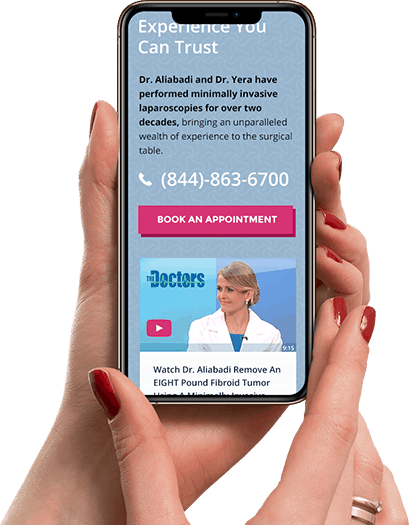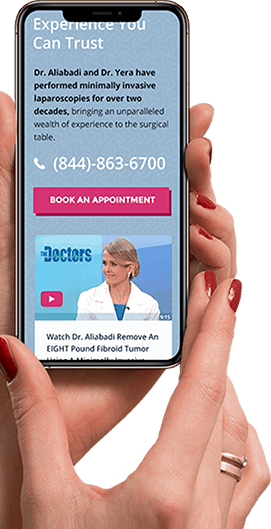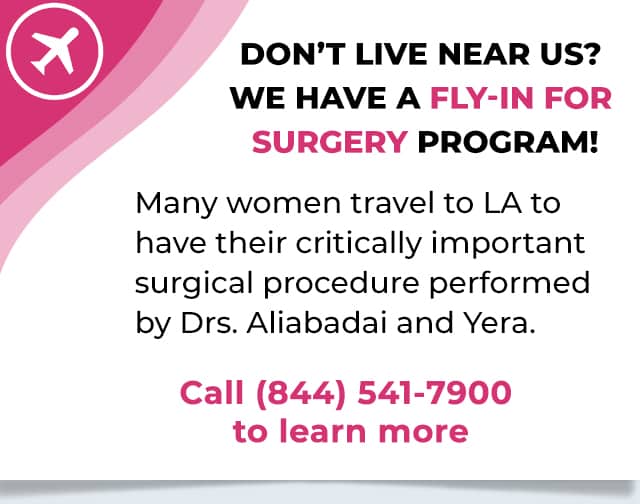What is Endometriosis?
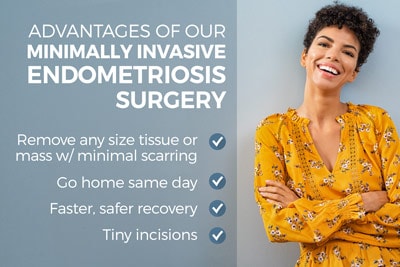
Endometriosis is a medical condition that occurs when the lining of the uterus, called the endometrium, grows in other places, such as the Fallopian tubes, ovaries, the bladder, or elsewhere in the pelvis.
The cause of endometriosis is unknown. One theory of endometriosis causes is that retrograde flow of menstrual debris through the Fallopian tubes results in endometrial tissue being deposited in unusual locations within the pelvic and abdominal cavities.
Endometriosis symptoms include severe pain, menstrual cramping, heavy menstrual period bleeding and pain with intercourse. What’s more, the abnormal tissue can leave damaging scars on the pelvic organs called adhesions that can result in infertility problems.
How do I know if I have endometriosis?
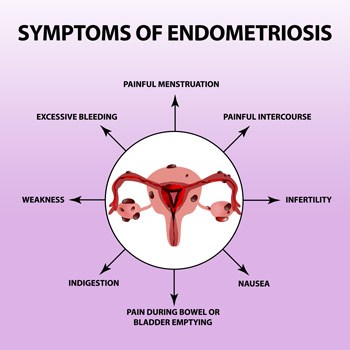
Endometriosis is probably the most under-diagnosed and misdiagnosed gynecologic condition seen in OB-GYN practices today. This condition can lead to years of suffering, as discussed on several episodes of The Doctors TV Show featuring Dr. Aliabadi and her patients.
A laparoscopy is the only test that can confirm a diagnosis of endometriosis 100%, but a doctor’s experience in treating endometriosis can address your pain or infertility a lot sooner and more effectively. That’s why a doctor with extensive experience in treating endometriosis is so critical. Most endometriosis patients that are seen in our office have been suffering for a decade or more.
If a laparoscopy is performed, the doctor will inspect your pelvic organs for signs of endometriosis, implants, or scar tissue from prior surgery that might be responsible for your pain or infertility.
How effective is laparoscopic surgery for endometriosis?
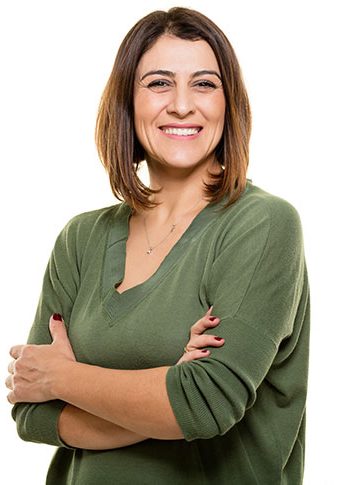
The key goals of removing endometriosis tissue through laparoscopy are to help reduce pain and infertility that have not responded to non-surgical treatments. That said, laparoscopic endometriosis surgery has its limitations.
Our minimally invasive approach requires only two small incisions in your abdomen: one at your belly button and one near your pubic hairline. If any endometrial tissue is detected that interferes with the function of your ovaries, fallopian tubes, bowel, or bladder, your surgeon can introduce special instruments through the incisions to remove the abnormal tissue via cutting, scraping, laser, or with electric current (called cautery).
If there is an endometrial cyst on your ovary (known as an endometrioma), your surgeon may choose to treat the cyst in one of three ways: by draining it, by removing part of the cyst, or by taking out the entire cyst. Removal of these cysts may relieve severe menstrual cramps, however, this is not always a long-term fix because cysts may grow back.
In fact, about 7 out of 10 women report less pain during the first few months following laparoscopy surgery. Unfortunately, in more than half of these women, symptoms return within two years. Studies have shown that starting hormone therapy such as birth control pills after surgery can extend endometriosis pain relief by preventing endometrial tissue from growing back quickly.
Endometriosis and fertility
If you present to your doctor complaining of infertility, surgical removal of endometriosis tissue can improve your chances of pregnancy if you have moderate to severe endometriosis. Unfortunately, this does not seem to apply to women with mild endometriosis.
Of course, many factors influence fertility, such as age and other health issues, and some patients, especially those over age 35, may be better served by non-surgical treatments, such as in vitro fertilization (IVF), insemination, or fertility medications.
When it comes to treating infertility, experience is paramount. Dr. Thais Aliabadi is a world-renowned fertility specialist with over 20 years of experience in this field. She can advise you as to what options are available to treat your infertility and educate you as to the pros and cons of each approach.
Laparoscopic endometriosis surgery recovery

You may experience some pain when you wake up after surgery. You will be given medications to help with discomfort. You will need to have arrangements for someone to drive you home. Your doctor will ask you to refrain from driving, having sexual relations, swimming, or bathing in tubs until they say it’s okay to do so.
Our patients who undergo laparoscopy surgery for endometriosis experience much quicker recovery times compared to open abdominal surgery patients. In fact, our patients typically return to work within a day or so and are fully recovered within 2 to 4 weeks.
It is typical for the first period after a laparoscopy to be heavier and more painful than usual, so it’s important to be prepared with extra sanitary pads and pain relievers and to take whatever time is needed to rest during this first post-op period.
Is there any risk in having laparoscopy surgery?
Laparoscopic surgery is extremely safe and involves much less risk than open abdominal surgery. In fact, there is a 0.3% risk of complications with laparoscopy. No matter how rarely complications occur, you should know what they are.
The risks for laparoscopic surgery include:
- Infection
- Internal bleeding that may necessitate making a larger abdominal incision in order to control
- Internal scarring following surgery (called adhesions) that binds the pelvic organs
- Damage to nearby structures such as your bladder, bowel, uterus, ureter, Fallopian tubes, or ovaries.
Of course, your surgeon will review all risks with you and answer any questions you may have so that you are prepared with all of the information you need to make an informed decision.
Are all laparoscopic surgeries the same?

Simply put, no. This is because the skill of the doctor is critical not only for correctly diagnosing endometriosis but also for treating it. This skill is acquired by treating a high volume of patients with this condition.
Surgical skill becomes especially important when it comes to treating endometriosis that is causing infertility. In fact, pregnancy rates following endometriosis surgery can vary greatly among surgeons.
Dr. Thais Aliabadi and Dr. Ramon Yera are part of a small minority of OB-GYNs in the United States who are experts in advanced minimally invasive techniques to remove endometrial scar tissue of any size during the same procedure in which they diagnose your endometriosis. They are recognized leaders in this field and have taught laparoscopic techniques to surgeons in the U.S. and all over the world.
What this means is that you can not only have your condition diagnosed and treated in one anesthesia session but also have any endometrial tissue or masses removed, no matter what size. This is possible because our surgeons are skilled laparoscopists who’ve performed thousands of these procedures.
Watch Dr. Aliabadi remove an 8-pound fibroid tumor laparoscopically on The Doctors TV Show.
And this is where the difference lies between our surgeons and most other OB-GYNs. Doctors Aliabadi and Yera have over four decades of experience between them in minimally invasive laparoscopic surgeries.
Welcome to the First Minimally Invasive Outpatient Surgical Practice Dedicated to Women

For years, Drs. Yera and Aliabadi have spared women from experiencing invasive open surgeries involving disfiguring surgical scars, extended hospital stays, and long painful recoveries.
Much of this unnecessary suffering was simply because women weren’t aware that minimally invasive out-patient surgery was available to treat endometriosis and other gynecological conditions.
That is why Drs. Yera and Aliabadi decided to create a surgical center dedicated exclusively to address women’s health needs.
Today, the women of Southern California (and those who wish to travel here) can now have access to two experts in women’s health. Drs. Aliabadi and Yera are among a handful of elite American OB-GYN surgeons who perform Minimally Invasive Out-Patient surgical procedures using advanced techniques that minimize incision size, tissue disruption, and recovery times.
If you are suffering from Endometriosis and are considering Endometriosis Surgery, it is very important to discuss any questions or concerns you have with your doctor.
If you wish to schedule a consultation to learn how we can help you or to establish care with us, please request a consultation online or call us at 844-541-7900.

